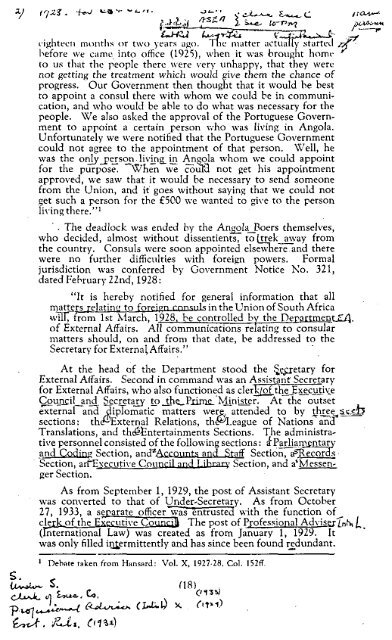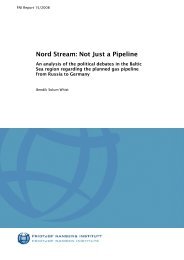SAIIA SOUTH AFRICAN DIPLOMATS ABROAD.pdf
SAIIA SOUTH AFRICAN DIPLOMATS ABROAD.pdf
SAIIA SOUTH AFRICAN DIPLOMATS ABROAD.pdf
Create successful ePaper yourself
Turn your PDF publications into a flip-book with our unique Google optimized e-Paper software.
eighteen months or two years ago. The matter actually started /yf •<br />
before we came into office (1925), when it was brought norm-'<br />
to us that the people there were very unhappy, that they were<br />
not getting the treatment which would give them the chance of<br />
progress. Our Government then thought that it would be best<br />
to appoint a consul there with whom we could be in communication,<br />
and who would be able to do what was necessary for the<br />
people. We also asked the approval of the Portuguese Government<br />
to appoint a certain person who was living in Angola.<br />
Unfortunately we were notified that the Portuguese Government<br />
could not agree to the appointment of that person. Well, he<br />
was the only_person.living,in Angola whom we could appoint<br />
for the purpose. When we couTd not get his appointment<br />
approved, we saw that it would be necessary to send someone<br />
from the Union, and it goes without saying that we could not<br />
get such a person for the €500 we wanted to give to the person<br />
living there." 1<br />
' - The deadlock was ended by the Angola_Boers themselves,<br />
who decided, almost without dissentients, to (trek_away from<br />
the country. Consuls were soon appointed elsewhere and there<br />
were no further difficulties with foreign powers. Formal<br />
jurisdiction was conferred by Government Notice No. 321,<br />
dated February 22nd, 1928:<br />
"It is hereby notified for general information that all<br />
matters relating to forfip;n ropsnis in the Union of South Africa<br />
wuTTfrom 1st March. 1928, be controlled by the Department.!^.<br />
of External Affairs. All communications relating to consular<br />
matters should, on and from that date, be addressed to the<br />
Secretary for External Affairs."<br />
At the head of the Department stood the $e£retary for<br />
External Affairs. Second in command was an Assistant Secretary<br />
for External Affairs, who also functioned as clerkfof the Executive<br />
Council_antL Secretary to the.Prime Minister. At the outset<br />
external and diplomatic matters were, attended to by three Si?<br />
sections: the^External Relations, the^League of Nations and<br />
Translations, and the^Entertainments Sections. The administrative<br />
personnel consisted of the following sections: a Parliamentary<br />
and Coding Section, and^Accounts and Staff Section, a^Records<br />
Section, arfExecutive Council nnd I ibrary Section, and a*Messenger<br />
Section.<br />
As from September 1, 1929, the post of Assistant Secretary<br />
was converted to that of Under-Secretary. As from October<br />
27, 1933, a separate officer was entrusted with the function of<br />
clerk_of the Executive Cou,ncj]|> The post of Professional Adviser / nh,<br />
(International Law) was created as from January 1, 1929. It<br />
was only filled intermittently and has since been found redundant.<br />
1 Debate taken from Hansard: Vol. X, 1927-28. Col. 152ff.<br />
Co.<br />
on*)<br />
08)













